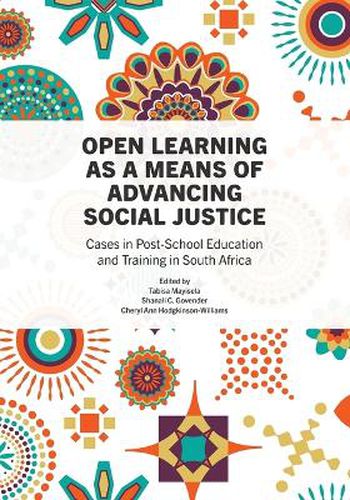Readings Newsletter
Become a Readings Member to make your shopping experience even easier.
Sign in or sign up for free!
You’re not far away from qualifying for FREE standard shipping within Australia
You’ve qualified for FREE standard shipping within Australia
The cart is loading…






This title is printed to order. This book may have been self-published. If so, we cannot guarantee the quality of the content. In the main most books will have gone through the editing process however some may not. We therefore suggest that you be aware of this before ordering this book. If in doubt check either the author or publisher’s details as we are unable to accept any returns unless they are faulty. Please contact us if you have any questions.
This volume investigates the uptake of 'open learning' in South African Technical Vocational Education and Training (TVET) colleges and higher education institutions. Comprised of 16 studies focused on activities at a range of colleges and universities across the country, these chapters aim to promote a better understanding of open learning practices across the Post- School Education and Training (PSET) sector, including issues such as: recognition of prior learning, access for students with disabilities, work integrated learning, professional development, novel student funding mechanisms, leadership for open educational practices, institutional culture, student support, blended and online learning, flexible learning, online assessment, open educational resource development models and funding, and micro- credentials.
This collection of peer-reviewed chapters contributes to understanding the ways in which South African PSET institutions and educators are interpreting 'open learning' as a means of advancing social justice. It includes a historical and contemporary understanding of the economic, cultural and political obstacles facing PSET, drawing on Nancy Fraser's theory of social justice as 'participatory parity' to better understand the ways in which 'open learning' may address systemic social injustices in order to allow South African students and educators to thrive.
This volume emerges from research conducted by the Cases on Open Learning (COOL) project, an initiative by the Department of Higher Education and Training in partnership with the Centre for Innovation in Learning and Teaching (CILT) at the University of Cape Town (UCT) in South Africa.
$9.00 standard shipping within Australia
FREE standard shipping within Australia for orders over $100.00
Express & International shipping calculated at checkout
This title is printed to order. This book may have been self-published. If so, we cannot guarantee the quality of the content. In the main most books will have gone through the editing process however some may not. We therefore suggest that you be aware of this before ordering this book. If in doubt check either the author or publisher’s details as we are unable to accept any returns unless they are faulty. Please contact us if you have any questions.
This volume investigates the uptake of 'open learning' in South African Technical Vocational Education and Training (TVET) colleges and higher education institutions. Comprised of 16 studies focused on activities at a range of colleges and universities across the country, these chapters aim to promote a better understanding of open learning practices across the Post- School Education and Training (PSET) sector, including issues such as: recognition of prior learning, access for students with disabilities, work integrated learning, professional development, novel student funding mechanisms, leadership for open educational practices, institutional culture, student support, blended and online learning, flexible learning, online assessment, open educational resource development models and funding, and micro- credentials.
This collection of peer-reviewed chapters contributes to understanding the ways in which South African PSET institutions and educators are interpreting 'open learning' as a means of advancing social justice. It includes a historical and contemporary understanding of the economic, cultural and political obstacles facing PSET, drawing on Nancy Fraser's theory of social justice as 'participatory parity' to better understand the ways in which 'open learning' may address systemic social injustices in order to allow South African students and educators to thrive.
This volume emerges from research conducted by the Cases on Open Learning (COOL) project, an initiative by the Department of Higher Education and Training in partnership with the Centre for Innovation in Learning and Teaching (CILT) at the University of Cape Town (UCT) in South Africa.